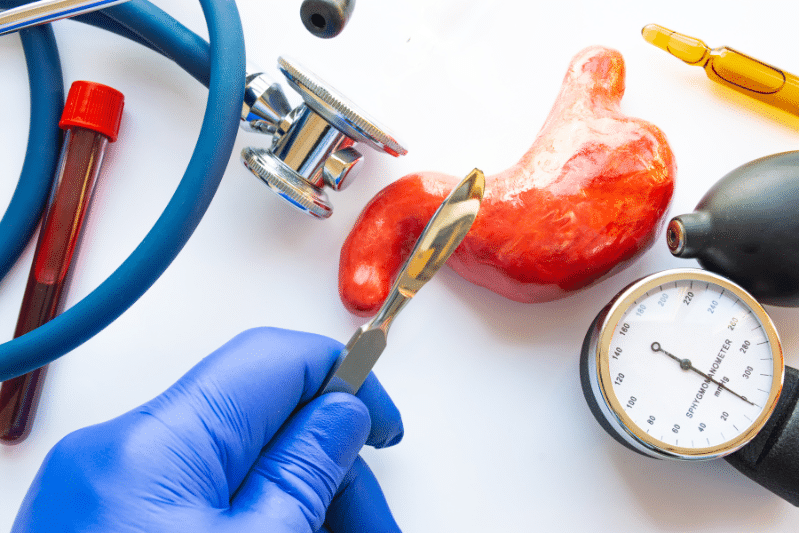Duodenal Switch Surgery Guide – Weight Loss Overview
Explore the duodenal switch surgery guide. Discover how duodenal switch results, how it works, and who it’s for, and learn everything you need to know about the weight loss surgical process, procedure, benefits, and risks.
What is Duodenal Switch Surgery?
Duodenal switch surgery is a complex weight-loss procedure. It modifies the stomach and small intestine, combining abdominal surgery and gastrectomy with an intestinal bypass. It restricts how much food the stomach can hold and how much nutrition the small intestine can absorb from food.
The procedure is a “malabsorptive” procedure, meaning it reduces the amount of nutrients absorbed by the body from food.
How Does it Differ from Gastric Bypass and Bariatric Surgeries?
Due to its complexity and high risk of complications. Doctors perform duodenal switch surgery less commonly compared to bariatric procedures. It involves more cutting and stitching in the digestive system. Further takes out or bypasses more of the gastrointestinal tract than other bariatric procedures do.
Weight Loss Surgical Process Overview
The surgery involves one to two weeks of major steps: sleeve gastrectomy and intestinal bypass. The procedure limits food intake and reduces nutrient absorption, including proteins and fats.

Duodenal Switch Surgery Guide – Benefits and Effectiveness
Open vs. Laparoscopic BPD/DS
The BPD and DS procedures can be performed laparoscopically or openly. In traditional open surgery and surgical procedures, the surgeon cuts into the abdomen. Laparoscopic BD/DS requires much smaller cuts using tiny instruments with light cameras for the operations. Laparoscopic open surgery also helps recover quicker and reduces the risk of infection and hernia. Surgical procedures include laparoscopic surgery robots for certain surgeries that aid in removing scars.
Weight Loss Expectations
The average weight loss with a full duodenal switch procedure is 80% of excess weight over two years.
People who have switch surgery maintain more rapid weight loss even over the long term. With an average sustained weight loss of 70% of excess weight over ten years.
Reduced Risk of Chronic Diseases
Duodenal switch surgery can help patients treat obesity-related conditions. Such as high blood pressure, high cholesterol, high blood sugar, heart disease, kidney disease, and diabetes.
The surgery has a 90% success rate for weight loss. 90% of people who lose weight or enough weight or at least 50% of their excess weight.
Enhanced Quality of life
Duodenal switch surgery can lead to permanent changes and significant improvements in overall health and quality of life. It can also improve self-esteem and confidence, As a result, leading to a more fulfilling life.

Duodenal Switch Surgery Guide – Comparison to Other Weight-Loss Surgeries
How Does the Duodenal Switch Compare with Other Common Weight-Loss Surgeries?
Comparatively, doctors perform switch surgery less frequently. Because it is more complicated or extreme surgery compared to other weight loss surgeries. However, the procedure involves removing a lot more weight loss less intestines. As well as removing some gastrointestinal tract and bypassing the digestive system as some procedures do.
So complications can arise in the course of the procedure or after they have occurred. However, the duodenal switch has become one of the most powerful surgical treatments for weight loss surgery. Furthermore, with the most significant lasting effects.
How Effective is the Duodenal Switch?
Duodenectomy is effective in reducing body fat and losing weight. Nonetheless, estimated that 95% of people are losing weight. The procedure has the same success rate to relieve other health conditions.
As far as 90% of diabetes patients can stop taking medications after duodenal switching. Many people with fewer than expected weight loss or gain after surgery are choosing revision surgical weight loss procedures by using duodenal swabs.
Gastric Bypass and Other Common Weight-Loss Surgeries
Gastric bypass surgery is a more complex surgery than a common weight-loss procedure. Moreover, it involves creating a third small intestine or stomach pouch and attaching it to the small intestine.
Other common weight-loss surgeries include sleeve gastrectomy and laparoscopic surgery with adjustable, gastric sleeve and banding.
Advantages and Disadvantages of Each Procedure
Duodenal switch surgery has the most profound weight loss results of all other bariatric procedures and weight loss surgery procedures used. But it also carries a higher risk of complications.
Gastric bypass surgery is less a complex procedure and has a lower risk of complications. However, it may not result in as much weight loss.
Choosing the Right Surgery
The choice of surgery depends on individual factors, including body mass index (BMI), overall health, and personal preferences. It’s essential to consult with a qualified surgeon to determine the best course of treatment.

Duodenal Switch Surgery Guide – Importance of Metabolic and Bariatric Surgery
Metabolic and bariatric surgery is a comprehensive approach to treating obesity and related health conditions. It involves a team of healthcare professionals working together to provide personalized care and support.
Metabolic and bariatric surgery can be an effective treatment option for individuals with severe obesity and diabetes. It can lead to significant weight loss and improve overall health and quality of life.
Who is a Good Candidate for the Procedure?
Individuals with a BMI of 40 or higher or a BMI of 35 with related diseases. For instance, high blood pressure, high cholesterol, and high or low blood sugar. They may be good candidates for metabolic and bariatric surgery.

Duodenal Switch Surgery Guide – Pre-Operative Diet
Before surgery, individuals may need to make dietary and lifestyle changes and start a physical activity program. They may also need to stop tobacco use and adjust medications.
-
Certain medications and supplements may need to be avoided before surgery, including blood thinners and non-steroidal anti-inflammatory drugs (NSAIDs).
-
Individuals should plan for recovery after surgery, including arranging for help at home if needed.
They should also follow a special diet plan, starting with liquids and gradually introducing pureed foods, and eventually solid foods.
Risks and Complications of Duodenal Switch Surgery
Duodenal switch surgery carries a higher risk of complications, including nutritional deficiencies, bowel movements, and internal bleeding.
-
Individuals may also experience loose bowels and foul-smelling gas if dietary guidelines are not followed.
-
Working with a qualified surgeon and following post-operative instructions can help minimize risks and complications.
-
Individuals should also attend regular follow-up appointments to monitor progress and prevent complications.
-
Post-operative care and follow-up are crucial for preventing complications and ensuring successful further weight loss surgery.
Individuals should follow a healthy diet and exercise regularly to maintain weight loss and overall health.

Life After Duodenal Switch Surgery – Nutrition Guidelines
Individuals will need to make permanent dietary changes, including taking vitamin and mineral supplements to prevent nutritional deficiencies. They say patients should also follow a diet of protein-dense foods and avoid high-calorie, high-fat foods.
-
Individuals may need to make lifestyle adjustments. It includes getting regular physical activity and exercise.
-
They should also seek support from family, friends, and support groups to maintain weight loss and overall health.
If you are wondering what would be the next steps considering duodenal switch surgery. Call us or schedule a teleconsultation with our experienced surgeons. To determine if duodenal switch surgery is the right option. Our surgeons will provide personalized guidance and support throughout the process.










